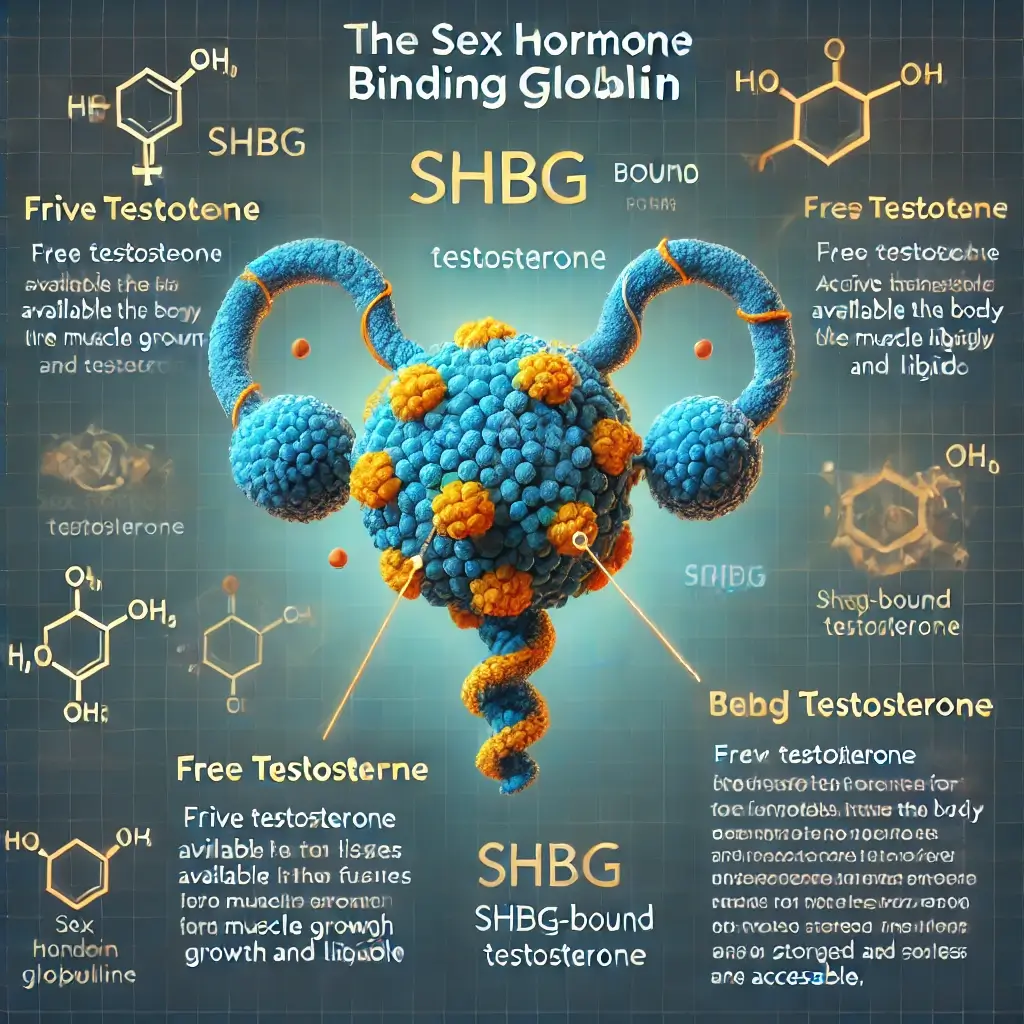Understanding SHBG and Its Role
Sex hormone-binding globulin (SHBG) is a protein that binds to sex hormones in the bloodstream. SHBG has an affinity for testosterone, but it’s important to understand its specific function. SHBG binds to both active and inactive forms of testosterone. It’s a protein synthesized by the liver that plays a crucial role in controlling the amount of sex hormones, particularly testosterone, available for use in the body.
Types of Testosterone: Free and Bound
This protein can attach itself to two variations of testosterone: unbound testosterone and testosterone bound to SHBG. Free testosterone is a biologically active hormone easily accessible and usable by the body’s tissues. This specific variant of testosterone can directly engage with and impact the activities of cells and organs.
The Importance of Free Testosterone
Unbound testosterone, also known as free testosterone, is available for the body to use in different physiological functions, including preserving muscle growth, regulating sex drive, and boosting bone health.
SHBG-Bound Testosterone: Less Active But Not Inactive
Conversely, testosterone linked to SHBG is the version of the hormone that is not active. When testosterone binds to SHBG, cellular and tissue use availability decreases. This is because the attachment of SHBG to testosterone inhibits its ability to effectively interact with specific receptors in the body. The testosterone that is linked to SHBG is effectively isolated and unable to fully exert its biological effects.
Balancing Act: Free vs. Bound Testosterone
Maintaining the optimum balance between free testosterone and testosterone bound to SHBG is essential for optimal hormone levels and the correct functioning of many body systems. Variables like age, gender, and specific medical ailments can impact the concentrations of SHBG and, subsequently, the amount of unbound testosterone accessible in the body.
The Importance of Understanding SHBG and Testosterone Interaction
Healthcare personnel must comprehend the correlation between SHBG and the various types of testosterone to effectively diagnose and treat hormonal abnormalities.
SHBG: A Storage System for Testosterone
SHBG does not fully deactivate testosterone. Although testosterone is attached to SHBG, it is not completely inaccessible. It functions as a storage system, gradually releasing a certain amount of testosterone into the bloodstream as the body requires.
Analogy: SHBG as a Carrier Protein
SHBG can be conceptualized as a carrier protein that facilitates the transportation of testosterone in the bloodstream. Some testosterone molecules exist in a free state, meaning they are not bound and can be readily used. In contrast, others are transported by SHBG. The testosterone bound to SHBG is a temporary reservoir with a gradual release mechanism rather than completely without value.
Impact on Testosterone Levels
Elevated levels of SHBG can result in an increased total testosterone measurement in a blood test but a decreased proportion of free testosterone. This occurs because a greater amount of testosterone is bound to SHBG, reducing unbound testosterone in circulation.
Weight and SHBG: A Complex Relationship
As previously stated, obesity is correlated with elevated levels of SHBG. This can result in a scenario where an individual may exhibit a typical or even elevated total testosterone level in a blood test but a diminished quantity of unbound testosterone that is accessible for utilization by the body.
Implications for Testosterone-Related Symptoms
This can exacerbate symptoms associated with low testosterone, such as reduced sexual desire or erectile dysfunction.
Assessing Testosterone Status: A Comprehensive Approach
When assessing a man’s testosterone state, a doctor will usually take into account both the levels of total testosterone and SHBG. Although the overall testosterone level may be within the normal range, a high level of SHBG can suggest a relative lack of free testosterone.
